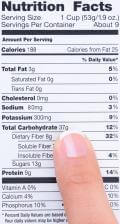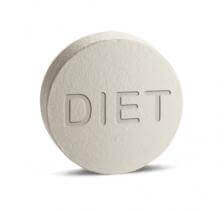Top 5 Fat Loss Lies
Get-Fit Guy reveals the top 5 fat loss lies perpetuated by the weight loss industry – plus tips on how to stay healthy and fit for good.
Ben Greenfield
Listen
Top 5 Fat Loss Lies

There’s no denying that people are making money off our expanding waistlines and our desire to lose fat, tone muscle, and get better bodies. But where there’s money, there’s often myths and mistruths, too. So in this episode, you’re going to discover the top 5 fat loss lies perpetuated by the weight loss industry – plus, the truth behind the claims.
Top 5 Fat Loss Lies
Lie #1: Food labels are steeped in science and can be trusted

Most of us, at one time or another, have inspected the food label on a package of food or a meal description on a restaurant menu and perhaps eaten just a little bit more content in the knowledge that he item was low-sodium, low-calorie, or low-fat.
But food labels are not always pristine and accurate accounts of what’s inside the package. For example, a study published in the Journal of the American Dietetic Association found that the actual amount of calories in frozen foods was an average of 8% higher than what was listed on the label. That same study found that items served in restaurants had 18% more calories than the menus said they did. These kind of gross inaccuracies are prevalent on packaged foods as well.
The food label discrepancy is partially due to the fact that under rules published by the FDA, which regulates nutrition labels on foods, “The ratio between the amount obtained by laboratory analysis and the amount declared on the product label in the Nutrition Facts panel must be 120% or less.”
In a nutshell, this means that if a lab analysis of a food found that it had 120 calories, the food’s packaging could state that it had 100 calories and would still be in compliance with FDA regulations. And that’s not all. If a food that has 20 grams of fat – but only listed 17 grams of fat on the label – it would also be in compliance. It gets even better: The FDA requires that food packages contain at least 99% of the weight listed on the box, so many food manufacturers often put more food into the package than they list on the label in order to make sure they comply with these regulations.
In summary, this means that if you’re eating lots of packaged foods, you may be getting over 20% additional calories than what you actually think! This is why I recommend shopping the perimeter of the grocery store, where there are fresh items in their raw, unpackaged form. But even then you need to be careful if you’re using websites to calculate nutrition data on those food items, since the simple act of cooking a food actually makes it higher in calories!
Lie #2: If it’s in a packaged bottle it must be 100% safe
Many popular fat loss products can cause serious side effects. Take for example OxyElite Pro, which is marketed as a weight loss, muscle gain, and metabolism boosting supplement, but has been linked to dozens of cases of hepatitis, liver failure (some patients needed liver transplants), and even death!

The diet-supplement market primarily exists because supplements are far less strictly regulated than many foods and drugs. Similar to the case of OxyElite, most FDA regulation of supplements only happens when the FDA hears complaints from consumers after the supplement is already on the market. Because of this, it can take months for dangerous, toxic, or tainted items to be removed from the shelves.
The moral of the story: Beware of weight loss supplements!
Lie #3: A product’s weight loss claims are always proven
Many companies in the weight loss industry are willing go after our wallets by stretching the truth of what their products will do.

In 2010, Weight Watchers sued Jenny Craig over commercials that claimed Jenny Craig clients lost, on average, over twice as much weight as those on their largest weight-loss program. In contrast, Weight Watchers asserted that no major clinical trial was done and that the claims by Jenny Craig were false and misleading. The companies reached a settlement, and Jenny Craig agreed to never again broadcast the information in that ad again, in any form.
As I mentioned in myepisode on fitness fads, you should be especially cautious of products that are endorsed by celebrities, promise quick results, or use word such a “proprietary blend” and “secret formula.” Creams and patches that promise to help with weight loss are also notoriously ineffective.
Lie #4: Dieting is an effective weight loss strategy

One possible reason for this decline in the number of people dieting is that we may be becoming more accepting of an overweight appearance. As a matter of fact, in 1985, surveys showed that 55% of Americans said they thought that people who were not overweight were significantly more attractive than those who were overweight. But a 2012 study by that same NPD group found that number to have dropped by over half, to nearly 23%. So we may be placing less of a priority on “getting thin.”
Or perhaps people are simply realizing that fad diets don’t really work that well in the first place – reflected in the fact that weight loss diet industry leader Weight Watchers – which has over 1 million members – saw its meeting attendance decline more than 15% in 2013.
Another reason that dieting is on the decline is people may actually be realizing that dieting doesn’t actually work as well as we might think. In one of the most comprehensive reviews of diet studies, researchers at the University of California found that people who diet usually lose 5% to 10% of their starting weight in the first 6 months, but 1/3 to 2/3 of them end up regaining all that weight (and more!) within 4-5 years.
I’m keeping my fingers crossed that people are simply realizing that just eating real, healthy food and pushing away from the table just a bit earlier is a smarter and more sustainable way to stay healthy.
Lie #5: Weight loss surgery is a safe and lasting final cure

But weight loss surgery carries serious risks and side effects, probably due to the fact that you’re getting crucial parts of your digestive system cut out and removed from your body. The Department of Surgery at the University of Southern California lists infections, ulcers, spleen injuries, stroke, heart attack, and death as some possible side effects of weight loss surgeries.
The department also estimates that one out of every 200 people die following complications from gastric bypass surgery and one out of every 1,000 from gastric banding. Although these odds are improving because many of these surgeries are now done via minimally invasive procedures such as laparoscopically, I’d highly recommend that you consider daily physical activity, a healthy diet, and the entire weight loss section of Quick and Dirty Tips before shoveling over the money and taking on the risks of having portions of your organs removed.
In a nutshell, all clues point once again to the fact that nothing really replaces physical activity and eating real, healthy food.
If you have more questions about these five fat loss lies, then leave them over at Facebook.com/GetFitGuy. And check out all our Quick and Dirty Tips on healthful eating and moderate exercise that will help keep you healthy and well at quickanddirtytips.com/health-fitness.

